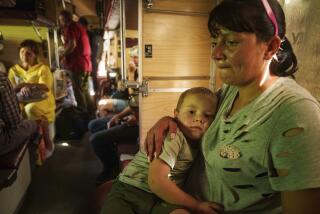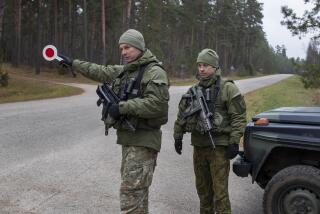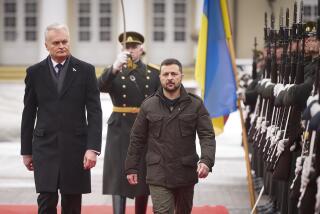Soviets Report Troop Pullout From 3 Independence-Minded Republics : Baltics: The action appears intended to avert clashes at pro-democracy rallies. Permanent garrisons of an estimated 100,000 troops remain.
- Share via
MOSCOW — Soviet authorities, attempting to calm the country’s political tensions, announced the withdrawal on Wednesday of most of the additional troops deployed in the Baltic republics and pledged that new military patrols in urban areas will be used only to fight crime.
Boris Pugo, the Soviet interior minister, said in an interview published Wednesday that all the paratroopers sent to the Baltic republics of Estonia, Latvia and Lithuania at the beginning of the month had been withdrawn and that the internal security troops there had been reduced by two-thirds.
Pugo also said that the decision to deploy the controversial military patrols, which are to begin Friday, will be left to republican and regional officials and that the soldiers will be assigned to curb crime and hooliganism.
Both declarations appeared intended to step back from the confrontation looming this weekend when radicals hope to rally supporters in pro-democracy demonstrations protesting the Soviet leadership’s apparent slide to the right.
Liberals have been particularly concerned that the government intended to use troops to suppress political demonstrations and that the country’s major cities would be put under effective martial law. “The army must not be used to muzzle the people,” the avant-garde newspaper Moscow News said Wednesday in a front page commentary.
But Pugo said that was not the government’s intention. “It is not public rallies . . . that we have in mind but hooliganism and other criminal activities,” he said in an interview in the daily newspaper Rabochaya Tribuna.
Other officials emphasized that the patrols of three or four soldiers or sailors would be under the command of a police officer and that generally only the police officer would be armed.
The move, originally decided upon by Pugo and Marshal Dmitri T. Yazov, the defense minister, and approved formally this week by President Mikhail S. Gorbachev, was justified in terms of sharp increases in crime over the last three years.
The withdrawal of the paratroopers and internal security forces from the Baltic republics is highly symbolic for the show of force this month represented the Kremlin’s efforts to reassert its control there and to curb the independence movements.
The paratroopers, moreover, had carried out the seizure Jan. 13 of the Lithuanian television broadcast center in which 14 people, all but one of the victims civilians, had been killed. The army said that it was acting on behalf of an anonymous Committee of National Salvation, which has since announced a suspension of its activities.
Vytautas Landsbergis, the Lithuanian president, said that the withdrawal of Soviet troops could open the way for negotiations with Moscow on Lithuanian independence. “Our relations with the Soviet Union have to be settled, even after these bloody events, and we are ready to talk,” he said in Vilnius.
But he expressed skepticism that Soviet troops would pull out and noted that all three Baltic republics have large permanent garrisons, an estimated 100,000 troops.
“It is regrettable that the promises of the Soviet leadership are so often broken,” Landsbergis said. “Soviet military forces have not yet withdrawn from the occupied buildings of the Lithuanian state.”
Western newsmen and other observers in Vilnius nevertheless saw convoys of paratroopers leaving the Lithuanian capital by road and others being flown out from a military airfield on Tuesday and Wednesday.
A 20-year-old Lithuanian, Jonas Tautkus, died in Vilnius on Wednesday. He was shot in the head Monday evening by soldiers who had stopped his car in a search for draft-evaders. Lithuanian officials said that Tautkus was shot in the back of the head by the troops as he fled. Military authorities, however, said that he was hit by a ricocheting warning shot.
His death brought to 21 the number of people killed in the sudden violence in Lithuania and neighboring Latvia this month. Another victim of the violence during the broadcast center’s seizure remains in critical condition, Lithuanian officials said.
In the southern Soviet republic of Georgia, the parliament voted this week to establish a “national guard,” in effect its own army, to abolish the system of soviets, or local councils, and to dissolve unprofitable state and collective farms.
The measures, part of Georgia’s effort to move toward independence, seem certain to provoke a Kremlin response, since they challenge the whole basis and exercise of Soviet power in the republic.
But Gorbachev may hesitate to move in an area noted for its fierce nationalism, where Armenians and Azerbaijanis already have battled Soviet forces, and instead press for a broader resolution of the whole issue of autonomy within a reconstituted federation.
The current political situation and the future shape of the federation are both expected to be on the agenda today when the Soviet Communist Party’s policy-making Central Committee meets here. On Friday, the Council of the Federation, which brings together leaders of all the republics, will meet.
At a preliminary session on Wednesday, Oleg Shenin, a member of the party’s Politburo, stressed its commitment to nonviolence in the country’s political struggle.
The party would act on the basis of “legality, political methods, dialogue and discussion and reject violence as a means of political action,” Shenin reminded regional party leaders.
More to Read
Sign up for Essential California
The most important California stories and recommendations in your inbox every morning.
You may occasionally receive promotional content from the Los Angeles Times.










